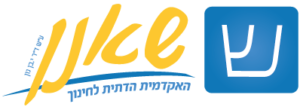קיצורי דרך
יחידה 1: הכוונה עצמית בלמידה והרציונל לטיפוחה
יחידה 2: עקרונות ה-הל"ה (הוראה-למידה-הערכה) החלופית
יחידה 3: הנחות יסוד להתערבות המכוונת לטיפוח לומדים בעלי הכוונה עצמית
יחידה 4: יצירת חזון משותף (מצע בית ספרי) ותוכנית לימודים בית ספרית (תלב"ס)
יחידה 5: סביבת לימוד המטפחת הכוונה עצמית
יחידה 6: שיח לימודי
יחידה 7: משוב והערכה בכיתה
יחידה 8: בית הספר כארגון לומד – מיקוד בלמידת המורים
יחידה 9: מאפייני התרבות הבית-ספרית המטפחת הכוונה עצמית בלמידה ובהוראה
יחידה 3 - מקורות מידע, מנוחה בירנבוים
זילברשטיין, מ' (1994). ניתוח מצבי הוראה ודיוקנו של מורה מקצועי. משרד החינוך והתרבות ומכון מופ"ת.
זילברשטיין, מ' (1998). הוראה רפלקטיבית – הבהרה קונספטואלית לתכניות הכשרה והשתלמות מורים. בתוך: מ. זילברשטיין, מ. בן-פרץ וש. זיו (עורכים). רפלקציה בהוראה: ציר מרכזי בהתפתחות מורה. (עמ' 15-42). תל אביב: מכון מופ"ת.
סנג'י, פ' מ' (1998). הארגון הלומד (מתרגם מאנגלית ברוך קורות). תל אביב: מטר.
שריג, ג' (1996). לדעת דבר: כישורי עיון וחקירה. תל אביב: מסדה.
שרן, ש' (1998). דימויים של ארגון בית-ספר. בתוך: ש' שרן, שחר, ח', ולוין, ת' (עורכים). בית-הספר החדשני ארגון והוראה. (עמ' 13-35). תל אביב: רמות.
Berry, J., & Sahlberg, P. (1996). Inventing pupils' ideas of learning. Learning and Instruction, 6(1), 19-36.
Birenbaum, M. (Sept. 13, 2000). New insights into learning and teaching and the implications for assessment. Keynote address at First Conference of the Special Interest Group on Assessment and Evaluation of the European Association for Research on Learning and Instruction (EARLI). Maastricht, The Netherlands.
Brody. C. M. (1991). Co-operative learning and teacher beliefs: a constructivist view. Paper presented at the Annual Meeting of the American Educational Association, Chicago, IL.
Buchmann, M. (1993). Beyond planning and decision making: Professional development in teacher thinking, in: L. Kremmer-Hayon, H. C. Vonk, & R. Fesler (Eds.), Teacher professional development: A multiple perspective approach (pp. 1-22). Amsterdam: Lisse, Swets & Zeitlinger.
Butler, J. (1992). Teacher professional development: An Australian case study. Journal of Education for teaching, 18(3), 221-238.
Cochran-Smith, M., & Lytle, S. L. (1993). Inside/outside: Teacher research and knowledge. New York: Teachers College.
Dewey, J. (1933). How we think: A restatement of the relation of reflective thinking to the educative process. Chicago, IL: Heath.
Entwistle, N. (1986). Understanding classroom learning. London: Hodder & Stoughton.
Gore, J. M. (1988). Reflection on reflective teaching. Journal of Teacher Education, 38(2), 33-39.
Hofer, B., & Pintrich, P. (1997). The development of epistemological theories: Beliefs about knowledge and knowing and their relation to learning. Review of Educational Research, 67(1), 88-140.
Louden, W. (1992). Understanding reflection through collaborative research. In: A Hargreaves & M. Fullan, (Eds.) Understanding teacher development (pp. 178-215). New York: Teacher College.
Matron, F., Dall'Alba, G., & Beaty, E. (1993). Conceptions of learning. International Journal of Educational Research, 19 (3), 277-300.
Olson, D. R., & Bruner, J. S. (1997). Folk psychology and folk pedagogy. In D. R. Olson & N. Torrance (Eds.), Handbook of education and human development (pp. 9-27). London: Blackwell.
Prosser, M., Trigwell, K., & Taylor, P. (1994). A phenomenographic study of academics' conceptions of science learning and teaching. Learning and Instruction, 4, 217-231.
Säljö, R. (1979). Learning about learning. Higher Education, 8, 443-451.
Schön, D.A. (1987). Educating the reflective practitioner. San Francisco, CA: Jossey-Bass.
Shulman, L. S. (1987). Knowledge and teaching: Foundations of the new reform. Harvard Educational Review, 57 (1),1-22.
Sigler, J. (1999). Best practices and guiding principles: – a training guide to successful development of a learning organization. Futurics, 23 (1/2), 67-73.
Van Manen, M. (1977) Linking ways of knowing with ways of being practical. Curriculum Inquiry, 6, (205-228).
Villar, L. M. (1994). Teaching: Reflective. In T. Husen & T. N. Postlethwite (Eds.), The international enciclopedia of education (2nd. Ed.). Prgamon.
